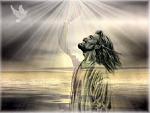
Main Page
Our Lineage
How We Are Different
For those who would question the validity of the sacraments of The Old Catholic Faith Gnostic Church:
Pope John Paul II ratified and ordered the publication of Dominus Iesus on 16 June 2000 at the Vatican. Joseph Cardinal Ratzinger (now Pope Benedict XVI) signed this Declaration of the Congregation for the Doctrine of the Faith in August of the same year.
Therefore, there exists a single Church of Christ, which subsists in the Catholic Church, governed by the Successor of Peter and by the Bishops in communion with him. The Churches which, while not existing in perfect communion with the Catholic Church, remain united to her by means of the closest bonds, that is, by apostolic succession and a valid Eucharist, are true particular Churches. Therefore, the Church of Christ is present and operative also in these Churches, even though they lack full communion with the Catholic Church, since they do not accept the Catholic doctrine of the Primacy.
The Church is the “universal sacrament of salvation”, since, united always in a mysterious way to the Saviour Jesus Christ, her Head, and subordinated to him, she has, in God's plan, an indispensable relationship with the salvation of every human being. For those who are not formally and visibly members of the Church, “salvation in Christ is accessible by virtue of a grace which, while having a mysterious relationship to the Church, does not make them formally part of the Church, but enlightens them in a way which is accommodated to their spiritual and material situation. This grace comes from Christ; it is the result of his sacrifice and is communicated by the Holy Spirit”; it has a relationship with the Church, which “according to the plan of the Father, has her origin in the mission of the Son and the Holy Spirit”.
In treating the question of the true religion, the Fathers of the Second Vatican Council taught: “We believe that this one true religion continues to exist in the Catholic and Apostolic Church, to which the Lord Jesus entrusted the task of spreading it among all people. Thus, he said to the Apostles: ‘Go therefore and make disciples of all nations baptizing them in the name of the Father and of the Son and of the Holy Spirit, teaching them to observe all that I have commanded you' (Mt 28: 19-20). Especially in those things that concern God and his Church, all persons are required to seek the truth, and when they come to know it, to embrace it and hold fast to it”.
The revelation of Christ will continue to be “the true lodestar” in history for all humanity: “The truth, which is Christ, imposes itself as an all-embracing authority”. The Christian mystery, in fact, overcomes all barriers of time and space, and accomplishes the unity of the human family: “From their different locations and traditions all are called in Christ to share in the unity of the family of God's children... Jesus destroys the walls of division and creates unity in a new and unsurpassed way through our sharing in his mystery. This unity is so deep that the Church can say with Saint Paul: ‘You are no longer strangers and sojourners, but you are saints and members of the household of God' (Eph 2:19)”.